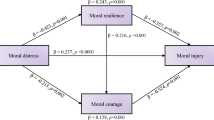Abstract
A cross-sectional study using Spiritual Coping Questionnaire (SCQ) to explore the spiritual stress coping among Muslim Emergency and Critical Care nurses. 113 Participants were recruited. SCQ demonstrated good validation estimates. Positive religious behavior was the main spiritual coping with job stress. Likewise, spiritual coping was highly perceived as religious. Critical care nurses reported significantly higher positive social coping. Nurses with longer work experiences were significantly better in positive spiritual coping. Spiritual coping practices are highly prevalent in healthcare settings despite still lacking integration of spiritual components in its physical infrastructure, health policy and management.
Similar content being viewed by others
References
Abdul-Mumin, K. H. (2018). The process of internationalization of the nursing and midwifery curriculum: A qualitative study. Nurse Education Today,46, 139–145. https://doi.org/10.1016/j.nedt.2016.09.003.
Akbar, R. E., Elahi, N., Mohammadi, E., & Khoshknab, M. F. (2016). What strategies do the nurses apply to cope with job stress? A qualitative study. Global Journal of Health Science,8(6), 55–64. https://doi.org/10.5539/gjhs.v8n6p55.
Baharuddin, E. B., & Ismail, Z. B. (2015). 7 Domains of spiritual intelligence from Islamic perspective. Procedia: Social and Behavioral Sciences,211, 568–577. https://doi.org/10.1016/j.sbspro.2015.11.075.
Chan, E. S., Koh, D., Teo, Y. C., Hj Tamin, R., Lim, A., & Fredericks, S. (2013). Biochemical and psychometric evaluation of Self-Healing Qigong as a stress reduction tool among first year nursing and midwifery students. Complementary Therapies in Clinical Practice,19(4), 179–183. https://doi.org/10.1016/j.ctcp.2013.08.001.
Charzyńska, E. (2015). Multidimensional approach toward spiritual coping: Construction and validation of the Spiritual Coping Questionnaire (SCQ). Journal of Religion and Health,54(5), 1629–1646. https://doi.org/10.1007/s10943-014-9892-5.
Chen, S.-Y., & Hsu, H.-C. (2015). Nurses’ reflections on good nurse traits: Implications for improving care quality. Nursing Ethics,22(7), 790–802.
Chin, G. V. S., & Haji Mohd Daud, K. (2015). Negotiating difference: The trope of anak derhaka and ideological endings in Bruneian writings. The Journal of Commonwealth Literature,50(2), 101–114.
Connor, J. B. (2016). Cultural influence on coping strategies of Filipino immigrant nurses. Workplace Health and Safety,64(5), 195–201.
d’Ettorre, G., & Greco, M. (2015). Healthcare work and organizational interventions to prevent work-related stress in Brindisi, Italy. Safety and Health at Work,6(1), 35–38.
Delaney, C., Barrere, C., Robertson, S., Zahourek, R., Diaz, D., & Lachapelle, L. (2015). Pilot testing of the NURSE stress management intervention. Journal of Holistic Nursing. https://doi.org/10.1177/0898010115622295.
Grafton, E., Gillespie, B., & Henderson, S. (2010). Resilience: The power within. Oncology Nursing Forum. https://doi.org/10.1188/10.ONF.698-705.
Laal, M. (2013). Job stress management in nurses. Procedia: Social and Behavioral Sciences,84, 437–442. https://doi.org/10.1016/j.sbspro.2013.06.581.
Lamke, D., Catlin, A., & Mason-Chadd, M. (2014). “Not Just a Theory” the relationship between Jin Shin Jyutsu® self-care training for nurses and stress, physical health, emotional health, and caring efficacy. Journal of Holistic Nursing,32(4), 278–289.
Lubinska-Welch, I., Pearson, T., Comer, L., & Metcalfe, S. E. (2016). Nurses as instruments of healing: Self-care practices of nurses in a rural hospital setting. Journal of Holistic Nursing,34(3), 221–228.
Pănescu, O., Timofte, A., Macovei, M., & Popescu, C. (2013). At the crossroads between western and eastern views on psychotherapy: An integrative approach. Procedia: Social and Behavioral Sciences,78, 375–379.
Ramlee, N., Osman, A., Salahudin, S. N., Yeng, S. K., Ling, S. C., & Safizal, M. (2016). The influence of religiosity, stress and job attitude towards organizational behavior: Evidence from public universities in Malaysia. Procedia: Economics and Finance,35, 563–573.
Schönfeld, P., Brailovskaia, J., Bieda, A., Zhang, X. C., & Margraf, J. (2016). The effects of daily stress on positive and negative mental health: Mediation through self-efficacy. International Journal of Clinical and Health Psychology,16(1), 1–10.
Wagner, J. I. J., & Gregory, D. M. (2015). Spirit at Work (SAW) fostering a healthy RN Workplace. Western Journal of Nursing Research,37(2), 197–216.
Wazqar, D. Y., Kerr, M., Regan, S., & Orchard, C. (2017). An integrative review of the influence of job strain and coping on nurses’ work performance: Understanding the gaps in oncology nursing research. International Journal of Nursing Sciences. https://doi.org/10.1016/j.ijnss.2017.09.003.
Acknowledgements
Sincere thanks to all the participants, nurse managers, and administrative staff of the Emergency Departments and Critical Care Services at the two Public Hospitals involved in this study.
Author information
Authors and Affiliations
Corresponding author
Ethics declarations
Conflicts of interest
We have no conflicts of interest to declare.
Additional information
Publisher's Note
Springer Nature remains neutral with regard to jurisdictional claims in published maps and institutional affiliations.
Rights and permissions
About this article
Cite this article
Ibrahim, M.A., Isa, K.Q., Haji-Idris, HA. et al. Spiritual Coping with Stress Among Emergency and Critical Care Nurses: A Cross-Sectional Study. Community Ment Health J 56, 287–293 (2020). https://doi.org/10.1007/s10597-019-00486-6
Received:
Accepted:
Published:
Issue Date:
DOI: https://doi.org/10.1007/s10597-019-00486-6




